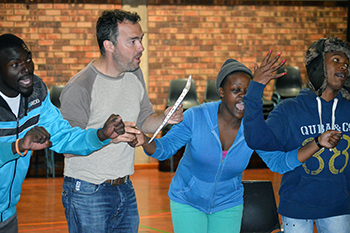Latest News Archive
Please select Category, Year, and then Month to display items
02 January 2025
|
Story Gerda-Marie van Rooyen
|
Photo Supplied
 Leading the research in South Africa is Prof Linus Franke from the Department of Soil, Crop and Climate Sciences.
Leading the research in South Africa is Prof Linus Franke from the Department of Soil, Crop and Climate Sciences.
Scientists are actively pursuing the successful breeding of diploid hybrid potatoes from inbred lines. This is expected to revolutionise potato breeding as it holds the key to rapid genetic progress. It will introduce new varieties for commercialisation through seed. Currently, existing potato variants have a gene that renders self-pollinated seeds infertile.
Prof Linus Franke, an academic in the Department of Soil, Crop and Climate Sciences at the UFS, is leading the research in South Africa. “This technology allows the production of genetically uniform potato seed that is easy to transport and largely disease-free.” He says this differs from conventional breeding whereby only vegetative propagation is possible due to tetraploid varieties in potatoes. It also risks carrying pests and diseases from one generation to the next – leading to the accumulation of pests and diseases with each round of multiplication.
Seed innovation
Prof Franke explains that Solynta BV, a seed company based in the Netherlands that produces potato varieties that can be grown from seed, has included South Africa in their research efforts because it is one of Africa’s largest producers and exporters. Through his academic relationship with Wageningen University and Research, a Dutch institution renowned for its agricultural endeavours and food production, the UFS became involved in researching hybrid potatoes grown from seed.
Diploid seeds containing two sets of chromosomes allow easier gene manipulation to increase predictability and speedier genetic progress. The breeding approach enables the incorporation of tolerance to pests, diseases, abiotic stresses (cold, heat, drought) and other desired genetic traits.
Although Prof Franke is optimistic about this research, he is not blind to disadvantages. “Potato seeds are tiny and have little energy reserves, making it harder to grow potatoes from seed than from tubers.” He says potatoes from seed will take longer to cultivate than tubers, as farmers need to grow plantlets from seeds first, adding six weeks to the growing period. “It is possible that commercial farmers can grow potatoes directly from seed. Alternatively, perhaps more likely, specialised growers will produce tubers of potatoes from seed; these tubers are then sold as seed tubers to other potato farmers, who then continue their normal practices of producing potatoes for the market from tubers.”
Financial benefits
Prof Franke says farmers have reason to get excited. “Seed potatoes will reduce input costs, as varieties with enhanced tolerance to pests and diseases require less pesticides. Planting one hectare of potatoes requires three to four tonnes of potato tubers, but only one 25 g packet of potato seeds.” Since potatoes are a more valuable commodity than maize, this technology might also increase farmers’ income potential.
I-DENT-I-TIES to shine at the Free State Arts Festival
2016-07-08

Erwin Maas with members of the student cast from the
Qwaqwa Campus. They are, from left: Mpho Xaba,
Lebohang Molefe and Tankiso Mofokeng.
Imagine this: A student cast from a rural campus; Production team consisting of a New York-based Dutch director, a South African screen and stage legend, a The Hague/Vienna-based Dutch theatre designer, and a Vienna-based Serbian performance-craft-artist and designer.
This sounds like a far-fetched flight of the imagination. But it is real and it is called ‘I-DENT-I-TIES’, a large-scale interdisciplinary performance project with international theatre professionals and students from the University of the Free State’s (UFS) Qwaqwa Campus.
According to the director of the project, Erwin Maas, the production explores the ‘dents’ and ‘ties’ of both individual and communal identification and distinctiveness and does this through the famous Basotho story of ‘Moshanyana Sankatana’ as a point of departure.
“We explore questions like ‘what are dents in our society as well as in ourselves’, ‘what ties me to who I really am and who I want to be’, ‘what does it mean to be me’, ‘what does it mean to be South African’,” said Maas, who has been working on this project since last year.
The production also celebrates personal, communal, and universal narratives and identities through song, dance, story-telling, and music. It explores the past, the present, and the future.
“This production will certainly reveal an extraordinary journey into what makes us unique and binds us together,” he added during the rehearsals that started in May at the Qwaqwa Campus.
Maas has teamed up with a well-known South African film and stage legend, Jerry Mofokeng, as consultant. Mofokeng, who introduced Maas to the ‘Sankatana’ story, has featured on a number of critically-acclaimed films that include ‘Cry, The Beloved Country’ as well as the Academy Award-winning ‘Tsotsi’. Maas has also worked with the Hague/Vienna-based Dutch designer Nico de Rooij and Djana Covic, a Vienna-based Serbian designer.
The production is a partnership between the UFS Student Affairs, Vrystaat Arts Festival, the Programme for Innovation in Artform Development, and the Kingdom of the Netherlands in South Africa. It will premiere at the Free State Arts Festival, held in Bloemfontein from 11 to 16 July 2016. This will be followed by a performance at the Qwaqwa Campus on 19 July 2016.